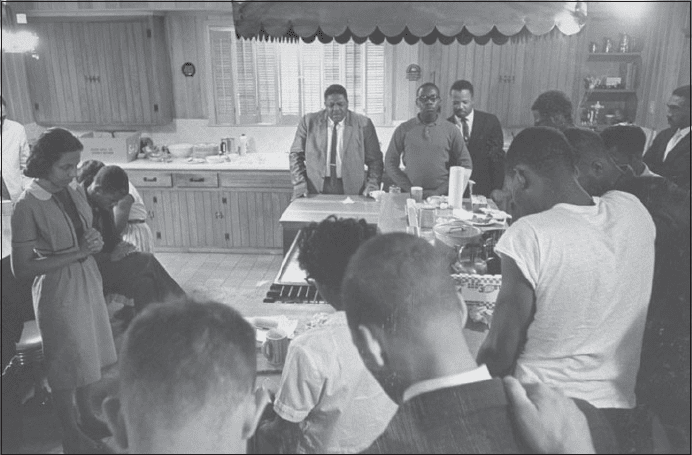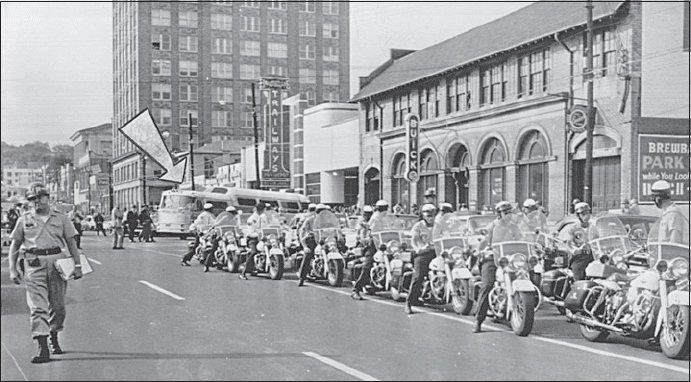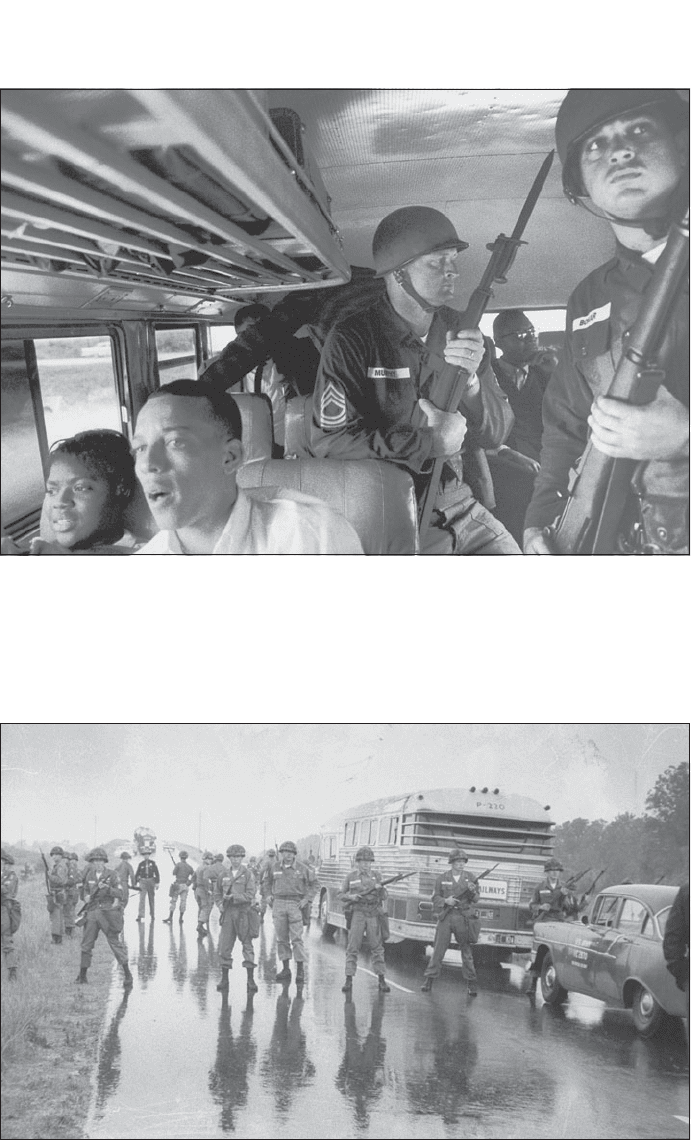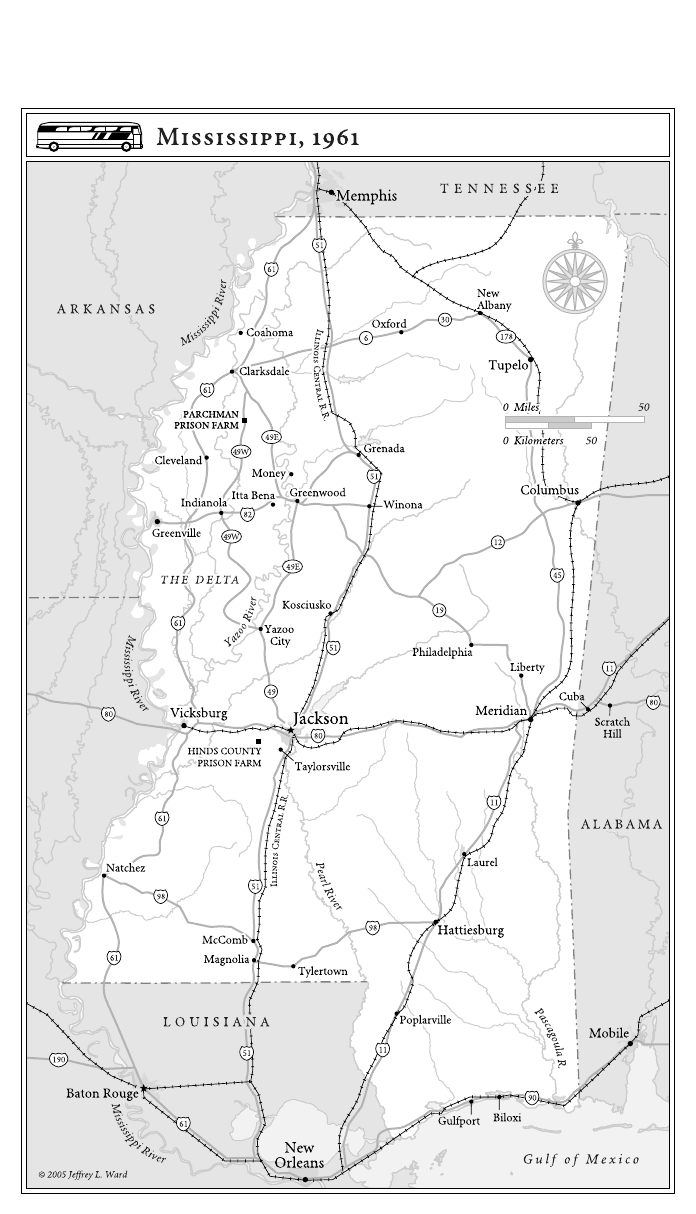Arsenault Raymond. Freedom Riders: 1961 and the Struggle for Racial Justice
Подождите немного. Документ загружается.

256 Freedom Riders
Holt’s sobering advice focused on the perils of protest in Mississippi, but
the Riders also had to face the possibility that they might not make it out of
Montgomery. Indeed, much of the discussion during and after the workshop
focused on the likelihood of more mob violence at the local bus stations.
Federal and state officials had promised to protect them from white vigilan-
tes, but few of the Riders were confident that these promises would be kept.
Considering the events of the past week and the continuing public banter
about state sovereignty, the intentions of law enforcement officials at all lev-
els were open to question. As the Sunday night siege had demonstrated, there
was even some doubt about the federal government’s ability to protect the
Riders. Could the limited number of federal marshals and National Guards-
men on the ground in Alabama and Mississippi muster enough force to hold
back a large and determined mob? None of the Riders could be sure, since,
aside from a few general and mildly comforting assurances, the details of the
government’s plans were unknown to them. Many of the Riders had decided
to go to Mississippi no matter what the risk, but, as several of them sat down
to write wills and final letters to loved ones before drifting off to bed, the
uncertainties of the situation tested their already frayed nerves.
46
Had the Freedom Riders been privy to the government’s planned secu-
rity measures, they might have slept a little easier. Although some of the
details were still being worked out on Tuesday evening—and even into the
morning hours—several days of close collaboration between federal and state
authorities in Mississippi and Alabama had produced a consensus that a mas-
sive show of force was needed to forestall any chance of violence. In a final
flurry of phone calls, Byron White and Governor Ross Barnett put the fin-
ishing touches on a military operation “worthy of a NATO war game,” as
one historian later put it. Unfortunately, the close collaboration also pro-
duced a tacit understanding that once the Freedom Riders arrived in Jackson
there would be no federal interference with local law enforcement. Earlier in
the week Barnett had promised “nonstop rides” for the Freedom Riders. Now
it appeared that Barnett was contemplating mass arrests and a declaration of
martial law. Unbeknownst to White and other federal officials, the governor
was even considering an alternate and more extreme plan that would put the
Freedom Riders in a state mental hospital.
While White stated emphatically that the Justice Department hoped that
the Freedom Riders would be allowed to travel on to New Orleans, he did
not insist upon it—in part because his superiors at the Justice Department
and the White House had decided that it was too risky to use federal mar-
shals or military personnel in Mississippi, but also because Robert Kennedy
had already struck a deal with the state’s senior senator, James O. Eastland.
After ex-governor James P. Coleman warned Marshall that Barnett was a
rank demagogue who “could not be trusted,” Kennedy turned to Eastland,
whom he considered to be a political and even personal friend. Unlike many
Northern senators, Eastland had been an enthusiastic supporter during
If You Miss Me from the Back of the Bus 257
Kennedy’s confirmation hearings, and despite the obvious ideological gulf
between them, the two men had developed a mutual trust during the early
months of the new administration. Over the course of three days and several
dozen phone conversations, this trust deepened as Eastland convinced the
young attorney general that he would see to it that Mississippi’s response to
the Freedom Rides served the best interests of the nation. Despite his unwa-
vering commitment to segregation, Eastland promised Kennedy that no harm
would come to the Freedom Riders in Mississippi; however, he could not
guarantee that they would escape arrest. Indeed, Eastland hinted that any
attempt to violate Mississippi’s segregation laws would result in mass arrests.
Though hardly pleased with the prospect of jailed Freedom Riders, Kennedy
assured Eastland that the federal government’s “primary interest was that
they weren’t beaten up.”
While he did not say so on the phone, Kennedy knew all too well that he
was in no position to press Eastland on this point. If the Jackson police chose
to put the Freedom Riders in jail, there wasn’t much that he or any other
federal official could do about it. In effect, the rioting in Alabama had con-
vinced the Kennedy brothers, along with White and Marshall, that almost
anything was preferable to mob violence—including unconstitutional arrests
of interstate travelers. Ironically, a tentative show of force in one state had
undercut federal authority in a second. As events would soon demonstrate,
the situation was made to order for Barnett, a militant segregationist eager to
cement his ties to the White Citizens’ Councils. Realizing that he had been
handed a scenario that would allow him to take credit for maintaining both
order and segregation, he was almost giddy by the time the arrangements
were complete. Inviting White to accompany the Freedom Riders to Jack-
son, Barnett promised that the Mississippi Highway Patrol would see to it
that he had “the nicest ride.” “You’ll be just as safe as you were in your baby
crib,” Barnett added with a chuckle.
47
In later years, some members of the administration—prompted by civil
rights leaders and historians who condemned the negotiations with Eastland
as a betrayal of democratic ideals—would acknowledge that the agreement
to defer to state authorities was a mistake. At the time, however, Robert
Kennedy and his colleagues regarded the deal as an unpleasant but necessary
resolution to a crisis that had already taken up too much of the administration’s
time and energy. In their eyes, the decision to accede to Eastland’s demands
was simply a postponement of the day of reckoning and not a surrender.
Sometime in the future the federal government would find a way to guaran-
tee the right to travel from state to state without accommodating outdated
segregationist laws and customs. But under the current conditions of Cold
War politics, administration leaders did not feel that they could afford a pro-
longed crisis that would almost certainly weaken the Democratic Party and
embarrass the nation in front of the world. In their view, the realities of both
domestic and international political life dictated a moderate course of action.
258 Freedom Riders
As the government official shouldering the ultimate responsibility for
the Freedom Riders’ arrests, John Kennedy could take comfort in the knowl-
edge that he was following a long tradition of presidential pragmatism. Like
many presidents before him, including Thomas Jefferson and Abraham Lin-
coln, he could claim that he was simply doing the best he could with a diffi-
cult situation. Indeed, against the dual backdrop of the Civil War Centennial
and the civil rights movement, the comparison with Lincoln was inevitable.
In the wake of Kennedy’s assassination in November 1963, pointing out the
parallels between the two martyred presidents became a popular pastime,
with some observers noting the broad and substantive similarities between
the historical challenges of the Lincoln and Kennedy eras.
A century before the Freedom Rider crisis, Lincoln had faced a similarly
wrenching dilemma involving the competing interests of political realism
and moral urgency. As a moderate Republican candidate in 1860, he com-
mitted his party to the twin goals of saving the Union and excluding slavery
from the territories. But, as he freely admitted, the two goals were not yet
equal, or even compatible. If forced to choose between partial abolition and
the preservation of the Union, he would choose the latter. It would take two
years of armed conflict and abolitionist ferment to push Lincoln toward a
more humane and democratic resolution of this dilemma. Only in Septem-
ber 1862 did he and the nation reach what the historian James McPherson
has labeled the “crossroads of freedom.” By issuing the Emancipation Proc-
lamation in the aftermath of the Union victory at Antietam, Lincoln estab-
lished the immediate abolition of slavery in the seceded states and a perpetual
Union as complementary war aims. Even though nearly three years of brutal
warfare—not to mention a century of largely unfulfilled promises—lay ahead,
the road taken from Antietam led African Americans to eventual, if incom-
plete, freedom.
In late May 1961, John Kennedy faced the Lincolnesque challenge of
extending that road through the Deep South. By sending federal marshals to
Alabama and affirming the constitutionally protected rights of all Americans,
Kennedy had taken an important first step toward the implementation of
racial justice. But on the morning of the twenty-fourth, as the Freedom Rid-
ers prepared to hack out a path of progress through the magnolia jungle of
Mississippi, no one could be quite sure how far or fast the young president
was willing to travel.
48
7
Freedom’s Coming and
It Won’t Be Long
We took a trip on a Greyhound bus,
Freedom’s coming and it won’t be long.
To fight segregation where we must,
Freedom’s coming and it won’t be long.
Freedom, give us freedom,
Freedom’s coming and it won’t be long.
—1961 “calypso” freedom song
1
THE FEDERAL PRESENCE in Alabama and Mississippi was both everywhere and
nowhere on Wednesday morning, May 24. Having asserted the power and
authority of the national government, the Kennedy administration had with-
drawn, at least temporarily, to the sidelines. The short-term, if not the ulti-
mate, fate of the Freedom Ride had been placed in the hands of state officials
who, paradoxically, had promised to protect both the safety of the Riders and
the sanctity of segregation. When the Trailways group of Freedom Riders
left Dr. Harris’s house at 6:15
A.M., they were escorted by a half-dozen jeeps
driven by Alabama National Guardsmen. This unimpressive show of force
raised a few eyebrows among the Riders, who knew next to nothing about
the details of the plan to protect them. But as the convoy approached the
downtown Trailways terminal, the familiar outline of steel-helmeted soldiers
came into view. In and around the terminal, more than five hundred heavily
armed Guardsmen stood watch over several clusters of white bystanders. Al-
though the Freedom Riders did not know it, there were also several FBI
agents and plainclothes detectives nervously wandering through the crowd.
As the Freedom Riders filed out of their cars, the scene was tense but quiet
until the crowd spotted King, who, along with Abernathy, Shuttlesworth, and
Walker, had agreed to accompany the Riders to the terminal. Still uncomfort-
able with his refusal to join the Ride, King was determined to provide the

260 Freedom Riders
disappointed students with as much visible support as possible. During an
early-morning prayer meeting at Harris’s house, he and Abernathy had blessed
the Riders; and in a show of solidarity his brother, A. D., had flown in from
Atlanta to help desegregate the Montgomery terminal’s snack bar. With some
members of the crowd screaming words of indignation, King led the com-
bined SCLC–Freedom Rider entourage through the white waiting room and
up to the counter, where he and the others ordered coffee and rolls. As sev-
eral reporters and cameramen pressed forward to record the moment, “the
white waitresses removed their aprons and stepped back,” but, with the ap-
proval of the terminal’s manager, black waitresses from the “Negro lunch
counter stepped up and took the orders,” thus breaking a half-century-old
local color bar. Local and state officials, it seemed, had put out the word that
nothing—not even the sanctity of Jim Crow dining—was to get in the way
of the Freedom Riders’ timely departure from Montgomery. Pleased, but
wary of this unexpected politeness, some of the Riders began to wonder
what other surprises were in the offing. They did not have to wait for very
long to find out.
Upon arriving at the Trailways loading bay, the Freedom Riders discov-
ered that there were no regular passengers waiting for the morning bus to
Prior to their departure for Mississippi, Freedom Riders hold a prayer breakfast
in Dr. Richard Harris’s kitchen in Montgomery, Wednesday morning, May 24,
1961. The man in the dark suit standing behind the table is A. D. King, brother
of Martin Luther King Jr. The man at the left corner of the table is the Reverend
Joe Boone of SCLC. The woman standing on the left is Diane Nash. The man in
the right foreground wearing a T-shirt is Hank Thomas. (Getty Photos)

Freedom’s Coming and It Won’t Be Long 261
Jackson. Alabama Guardsmen, on orders from General Graham, were only
allowing Freedom Riders and credentialed reporters to enter the bus. More
than a dozen reporters were already on board, and several others soon joined
them, as the Riders sized up the situation. Not all of the Riders were com-
fortable with the prospect of traveling to Jackson under such artificial condi-
tions, and others were simply scared to death, but eventually all twelve of the
Trailways Riders agreed to board the bus. Each, according to David Dennis,
a twenty-year-old Louisiana CORE activist and student at Dillard College,
“was prepared to die.” In addition to Dennis, the group included two South-
ern University students from New Orleans, Julia Aaron and Jean Thomp-
son; Harold Andrews, a student at Atlanta’s Morehouse College; Paul Dietrich
of NAG; and seven members of the Nashville Movement—Jim Lawson, Jim
Bevel, C. T. Vivian, Bernard Lafayette, Joseph Carter, Alex Anderson, and
Matthew Walker Jr. Three of the Nashville Riders—Lawson, Vivian, and
Anderson—were practicing ministers, and three others—Bevel, Lafayette,
and Carter—were divinity students. Dietrich was the only white. Walker and
Thompson were the youngest at age nineteen, and Vivian was the oldest at
thirty-six. Lawson, the third oldest at thirty-two, was the consensus choice as
the group’s designated leader and spokesperson.
2
Soon after the twelve Freedom Riders took their seats, General Gra-
ham, the movement anti-hero of the Sunday night siege, stepped onto the bus
to say a few words. Flanked by several Guardsmen, he warned the Riders—and
the newsmen scattered throughout the bus—that they were about to embark
on “a hazardous journey.” Seconds later, however, speaking in a reassuring
Accompanied by a military and police escort, the first group of Mississippi-bound
Freedom Riders leaves the Montgomery Trailways bus station, Wednesday morn-
ing, May 24, 1961. (Courtesy of Nashville Tennessean and AP Wide World)
262 Freedom Riders
voice, he insisted that “we have taken every precaution to protect you,” add-
ing: “I sincerely wish you all a safe journey.” This was not what the Riders had
come to expect from Alabama-bred officials, and several of the Riders thanked
him for humanizing their last moments in Montgomery. After Graham de-
parted, six Guardsmen remained on board, as an array of jeeps, patrol cars,
and police motorcycles prepared to escort the bus northward to the city lim-
its, where a massive convoy of vehicles was waiting. Once the bus reached
the city line, the magnitude of the effort to get the Freedom Riders out of
Alabama without any additional violence became apparent. In addition to
several dozen highway patrol cars, there were two helicopters and three U.S.
Border Patrol planes flying overhead, plus a huge contingent of press cars
jammed with reporters and photographers. As the Riders would soon dis-
cover, nearly a thousand Guardsmen were stationed along the 140-mile route
to the Mississippi border. Less obtrusively, there were also several FBI sur-
veillance units placed at various points along Highways 14 and 80. While
Graham, Mann, and other state officials were in the foreground running the
show, federal officials were in the background monitoring as much of the
operation as they could.
Leaving Montgomery a few minutes before eight, the convoy headed
west toward Selma, the first scheduled stop on the 258-mile trip to Jackson.
During the hour-long, fifty-mile journey to Selma, the Riders chatted ami-
ably with reporters, but when the bus arrived in the town that four years later
would become the site of the movement’s most celebrated voting rights march,
the National Guard colonel in charge of the bus announced that there would
be no rest stops on the journey to Jackson. Motioning to the crowds lining
the streets of Selma, the colonel did not have to explain why. But Lawson
and several of the other Riders made it clear that they did not appreciate the
heavy-handed style of protection being imposed on a Freedom Ride that was
supposed to test the constitutional right to travel freely from place to place.
“This isn’t a Freedom Ride, it’s a military operation,” Bevel yelled out, a
sentiment echoed by Lafayette, who confessed: “I feel like I’m going to war.”
At the same time, they couldn’t help wondering what kind of specific threats
had precipitated such extreme caution.
As the bus passed through Uniontown, thirty miles west of Selma, the
sight of fist-shaking whites on the side of the road was unnerving, but the
first sign of serious trouble came near Demopolis, where three cars of scream-
ing teenagers started weaving through the convoy in an attempt to chase
down the bus. After a brief stop, during which a nauseated Alex Anderson
momentarily left the bus to vomit on the side of the road, the teenagers were
detained long enough to allow the convoy to continue unimpeded to the
state line. The bus did not stop again until it reached the tiny border town of
Scratch Hill, Alabama. A few minutes later, the bus passed through the slightly
larger town of Cuba, prompting several of the Riders to serenade their com-
panions with what one reporter called “impromptu calypso rhythms.” One

Freedom’s Coming and It Won’t Be Long 263
Freedom Riders Julia Aaron and David Dennis, with National Guardsmen, on the
first freedom bus to Mississippi, Wednesday morning, May 24, 1961. The man
sitting on the back seat is Jim Lawson. (Photograph by Bruce Davidson, Magnum)
Alabama National Guardsmen protect the Freedom Riders’ Trailways bus near
the Mississippi border, Wednesday morning, May 24, 1961. (Photograph by Paul
Schutzer, Getty Photos)

264 Freedom Riders
Freedom’s Coming and It Won’t Be Long 265
of the songs, improvised by the Riders earlier in the journey, was an adaptation
of Harry Belafonte’s popular calypso ballad “The Banana Boat Song,” some-
times known as “Day-O.” “We took a trip on the Greyhound bus, freedom’s
coming and it won’t be long. To fight segregation where we must, freedom’s
coming and it won’t be long. Freedom, give us freedom, freedom’s coming
and it won’t be long,” the Freedom Rider chorus sang over and over again, as
waves of laughter rippled through the bus. Moments later, however, both
the music and the laughter gave way to the sobering reality of the martial
spectacle at the state line.
3
Matching their Alabama cousins, Mississippi authorities had assembled
a small army of National Guardsmen and highway patrolmen, enough to
escort half a dozen freedom buses into the state. If this was not bracing enough,
word soon came that Mississippi authorities had uncovered a plot to dyna-
mite the bus as soon as it crossed the state line. This and other unconfirmed
threats caused an hour’s delay, during which Mississippi Guardsmen searched
the nearby woods and General Graham and his Mississippi counterpart,
Adjutant General Pat Wilson, assessed the situation. While Wilson and
Graham worked out the details of the transfer, an impatient Jim Lawson
decided to hold an impromptu press briefing. To the amazement of the re-
porters encountering Lawson for the first time, the young minister com-
plained that the Freedom Riders had not asked to go to Mississippi in the
equivalent of an armored vehicle. As disciples of nonviolence, they “would
rather risk violence and be able to travel like ordinary passengers” than cower
in the shadow of protectors who neither understood nor respected their phi-
losophy of countering “violence and hate” by “absorbing it without return-
ing it in kind.” With the reporters still puzzling over what seemed to be a
foolhardy embrace of martyrdom, the bus resumed its journey around 11:30
A.M., nearly four hours after leaving Montgomery.
As soon as the bus crossed over the state line, Graham turned over con-
trol of the convoy to Mississippi’s commissioner of public safety, T. B.
Birdsong, and General Wilson, who promptly replaced the Alabama Guards-
men on board with six Mississippi Guardsmen under the command of Lt.
Colonel and future congressman G. V. “Sonny” Montgomery. After Wilson
informed the Freedom Riders and reporters on the bus there would be no
rest stops on the one-hundred-mile trip to Jackson, C. T. Vivian complained
to Montgomery that this decision was “degrading and inhumane,” consider-
ing that there was no restroom on the bus. Montgomery’s only response was
to order Vivian to sit down and be quiet. Stunned by this curt dismissal,
Vivian was unable to restrain himself. “Have you no soul?” he plaintively
asked Montgomery. “What do you say to your wife and children when you
go home at night? Do you ever get on your knees and pray for your inhu-
manity to your fellow man? May God have mercy on you.” Staring ahead,
Montgomery did not answer. While Vivian and others seethed, Birdsong
directed the motorcade toward Meridian, where the bus stopped briefly for
